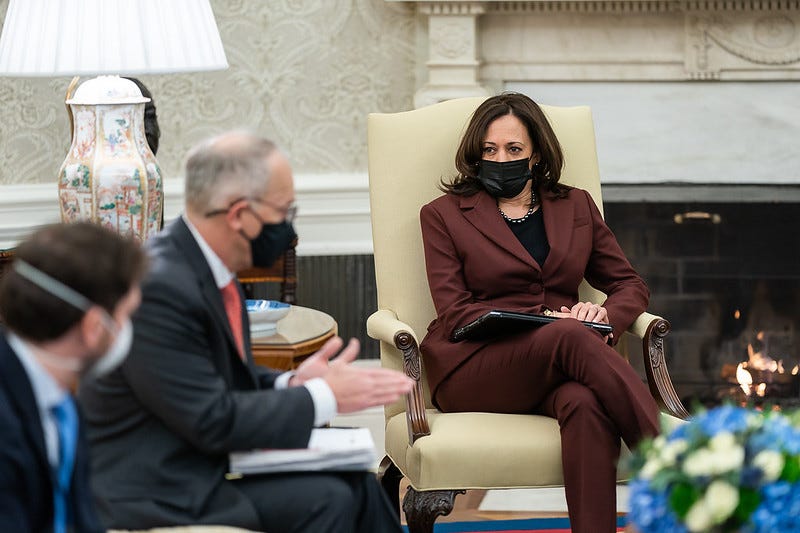Wake Up To Politics - November 15, 2021
Wake Up To Politics: Bannon expected to surrender to authorities
by Gabe Fleisher
Good morning! It’s Monday, November 15, 2021. Election Day 2022 is 358 days away. Election Day 2024 is 1,086 days away.
Welcome back to another week of waking up to politics. It’s going to be a big one — I’ve got you covered with an overview of the key dynamics to watch in the days ahead...
Driving the week: Bannon surrenders, infrastructure becomes law, Biden meets Xi
With Congress out of town, last week was fairly sleepy — except for one major development on Friday: former Trump strategist Steve Bannon was indicted on two counts of contempt of Congress.
The indictment was a significant victory for congressional oversight as a whole, but especially for the House select committee investigating the January 6 riot, which had sought the charges against Bannon after he failed to comply with a subpoena to appear before the panel and provide documents.
According to CNN, Bannon is expected to surrender to authorities today and appear in court this afternoon. The charges will keep the January 6 committee in the news, after the panel’s whirlwind week issuing two new batches of subpoenas and sparring with former President Trump in an ongoing court battle for key documents.
The next Trumpworld figure to watch is former White House chief of staff Mark Meadows, who declined to appear for a deposition before the House select panel on Friday. Will Meadows change his mind now that it’s clear the committee is serious about seeking contempt charges, and the Justice Department is willing to follow through? (The punishment for one count of contempt of Congress is 30 days to one year in jail, and a fine of $100 to $1,000.)
Another reason January 6 will be driving headlines this week: Two new books are coming out examining the end of the Trump era. “Betrayal” by ABC News chief Washington correspondent Jonathan Karl and “Republican Rescue” by former Gov. Chris Christie (R-NJ), a former Trump ally now breaking with his onetime friend, will both be released on Tuesday.
Karl’s book has unearthed new details on high-level attempts by the White House to overturn the 2020 election; the author has also released audio of his interview with Trump, in which the ex-president called it “common sense” for rioters to be chanting “hang Mike Pence” on January 6.

Over at the White House, the main event of the week is today’s signing ceremony for the $1 trillion bipartisan infrastructure package, which passed the House earlier this month.
Members of both parties will stand at President Biden’s side as he signs the infrastructure bill into law, the culmination of months of negotiations and legislative arm-twisting.
The package becoming law marks a key victory for Biden, but now an even bigger task looms: selling it. Biden’s approval rating dropped to a new low — 41% — in a Washington Post/ABC poll released this weekend; many White House aides believe turning around the president’s political fortunes depends on showcasing the virtues of his infrastructure bill to skeptical (or unaware) Americans.
Biden has also tapped former New Orleans Mayor Mitch Landrieu to supervise the implementation of the package; he will coordinate the distribution of hundreds of billions of dollars across the country to fund projects remaking roads, bridges, highways, and more.

On the other end of Pennsylvania Avenue, lawmakers are (once again) hoping to make progress on the other half of Biden’s domestic agenda: the $1.75 trillion “Build Back Better” social spending package.
The moderate Democrats who held up a House vote on the package have agreed to advance it this week, with one major caveat: they want information from the Congressional Budget Office (CBO) on how much the legislation will cost.
Staffers at the CBO are racing to complete their analysis; although a full “score” is not expected this week, the office will be releasing information on various provisions of the package on a piecemeal basis, which may be enough for the moderates. (However, the lawmakers may demand changes if the CBO score doesn’t watch what the White House has estimated.)
While the Senate waits for the House to act on “Build Back Better,” the upper chamber will turn to the National Defense Authorization Act (NDAA), the annual bill setting the budget for the Defense Department. Senate Majority Leader Chuck Schumer (D-NY) is bringing the measure to the floor after receiving criticism from both parties for dragging his feet.
Schumer told senators in a letter on Sunday that two other pieces of legislation could be folded into the NDAA: the U.S. Innovation and Competition Act (USICA), a bipartisan $250 billion bill aimed at increasing U.S. competitiveness with China, and a measure repealing the still-active authorization for use of military force in Iraq from 2002.
Congress is staring down a bruising final stretch before the end of the year. In addition to Democrats vying to pass their social spending package — which is likely not to receive Senate action until December — lawmakers must also pass legislation to extend government funding and lift the debt ceiling by December 3.
It remains unclear how any of those three tasks will shake out, but they all carry major consequences: The “Build Back Better” package represents just about every Democratic legislative priority in the book, while the failure to act before the December 3 deadline would send the government into a shutdown and the nation into a historic default crisis.
Put together, members of Congress might be looking at yet another holiday season spent on Capitol Hill.

One more thing for your radar: President Biden will hold his highly-anticipated virtual meeting with Chinese President Xi Jinping today.
The first summit between the two leaders comes amid heightened tensions between their countries, on issues including Taiwan, human rights, economic competition, and more.
More headlines to know
→ “COP26 climate deal calls for historic shift from fossil fuels” Axios
→ “U.S. warns Europe that Russia may be planning Ukraine invasion” Bloomberg
→ “Covid-19 cases rise in pockets of North and West, halting Delta variant’s decline in U.S.” Wall Street Journal
→ “Emails reveal new details of Trump White House interference in CDC Covid planning” Politico

Policy Roundup: Economics
On Mondays, Wake Up To Politics contributor Davis Giangiulio offers a briefing on the economic news to know this week:
Consumer sentiment fell in early November to a decade low. That’s according to The University of Michigan Consumer Sentiment Index, which released its new figures on Friday. To put this in perspective: the index shows consumers feeling worse about the economy now than they did in the spring of 2020, when lockdowns shut down entire sectors of the economy. According to the survey’s chief economist Richard Curtin, there is a “growing belief among consumers that no effective policies have yet been developed to reduce the damage from surging inflation.”
Other readings of the economy are also showing declining optimism. A new Washington Post/ABC News poll shows that 70% of Americans say the economy is “poor” or “not so good,” the most since 2014. Spending, however, has not shown any sign of contraction yet, and some economists are still predicting a “robust holiday shopping season,” according to The New York Times.
U.S. job openings fell in September, but a record number of people quit their jobs too. The Bureau of Labor Statistics released data on Friday showing 10.4 million job openings in September, down from 10.6 million in August. There is hope that with the Delta variant’s weakening presence in the economy that job openings could fall further as people return to the labor force.
But 4.4 million people quit their jobs in September too. This continues to fuel the narrative of “The Great Resignation,” where workers having an upper hand are rethinking their current employment positions and searching for different jobs. Workers are taking better-paying jobs, or at least looking for them, at a time when employers are desperate for help. Quits are centered in sectors where the work is typically lower pay and in-person. The question is if rising hourly wages and a weakening pandemic will make workers in those industries stay.
The budget deficit fell in October as pandemic-era spending declined once again. The deficit for last month stood at $165 billion, down from $284 billion last year, according to the Treasury Department. Spending has declined compared to last October, while revenues have risen. A Treasury official told Reuters that the decline comes is due to economic improvement spurring greater revenue, and the expiration of expanded unemployment insurance payments reducing government spending.
One more thing...
Back in Washington after traveling to France this week, Vice President Kamala Harris is facing a crush of headlines detailing her rocky debut in office. Here’s a sampling from over the weekend:
“Exasperation and dysfunction: Inside Kamala Harris’ frustrating start as vice president” CNN
“Biden-successor chatter grows and Harris isn’t scaring off anyone” Politico
“Harris and Buttigieg under the spotlight amid uncertainty over Biden’s future” Washington Post
The main thrust of the stories: Harris and her team are clashing with Biden’s top aides and other prominent Democrats as the VP continues to make missteps and struggles to make progress on a tough slate of issues that have been placed on her desk.
And in case you thought she had a glide path to the Democratic presidential nod in 2028 (or 2024, as Democrats wonder if Biden will run for a second term), think again.
Rival to watch: None of the Harris stories go more than a few paragraphs without mentioning Transportation Secretary Pete Buttigieg, who is seen as her top rival for the 2024 or 2028 nomination.
And while Harris has had a pretty dismal news week, Buttigieg — the administration’s infrastructure point person — is ascendant as he prepares for a $210 billion influx into his department budget that he can dole out to popular project across the country. “Buttigeg’s star rises,” the Associated Press declared in a headline, while Business Insider crowned him “the most powerful transportation secretary ever.”
Number to know: 28%. That was Harris’ approval rating in a recent USA Today/Suffolk poll. Ouch.

Daybook
All times Eastern.
→ At the White House, President Joe Biden will receive his daily intelligence briefing (9:30 am), participate in a Tribal Nations Summit to mark Native American Heritage Month (11 am), sign the bipartisan infrastructure package into law and deliver remarks (3 pm), and participate in a virtual meeting with Chinese President Xi Jinping (7:45 pm).
Vice President Kamala Harris will also deliver remarks at the infrastructure bill signing (3 pm) and at a virtual meeting on voting rights hosted by the Declaration for American Democracy Coalition (5 pm).
First lady Jill Biden will also deliver remarks at the Tribal Nations Summit (11:45 am) and attend the infrastructure bill signing (3 pm).
Press secretary Jen Psaki will hold her daily press briefing (1:30 pm).
→ On Capitol Hill, the Senate will convene (3 pm) and hold a cloture vote on Graham Steele’s nomination to be Assistant Secretary of the Treasury for Financial Institutions (5:30 pm).
The House will convene (2pm) and consider five pieces of legislation under “suspension of the rules,” all related to veterans:
S. 1031, to require the Comptroller General of the United States to conduct a study on disparities associated with race and ethnicity with respect to certain benefits administered by the Secretary of Veterans Affairs
H.R. 5671, to authorize the Secretary of Veterans Affairs to furnish seasonal influenza vaccines to certain individuals
H.R. 3665, to designate the medical center of the Department of Veterans Affairs in San Diego, California, as the Jennifer Moreno Department of Veterans Affairs Medical Center, and to support the designation of a component of such medical center in honor of Kathleen Bruyere
S. 894, the Hire Veteran Health Heroes Act
S. 1095, the Colonel John M. McHugh Tuition Fairness for Survivors Act
→ At the Supreme Court, the justices will release their weekly orders (9:30 am).
→ Also, Sen. Patrick Leahy (D-VT) will hold a press conference at the Vermont State Capitol to announce whether he will run for a ninth term next year (10 am). Leahy, 81, is the fourth longest-serving senator in U.S. history.




